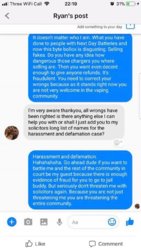I should think he's just spouting shit - trying to look big and tough...
Here is a section from Defences to Defamation...
Defences
Requirement of serious harm: "A statement is not defamatory unless its publication has caused or is likely to cause serious harm to the reputation of the claimant".
Truth: It is a defence for defamation to show the imputation in the statement complained of is substantially true. If one or more of the imputations is not true, the defence does not fail if the imputations not shown to be true do not seriously harm the claimant’s reputation. The common law defence of justification is abolished, as such section 5 of the
Defamation Act 1952 is repealed.
Honest opinion: It is a defence for defamation, to show the statement complained of was a statement of opinion; that it indicated, in general or specific terms, the basis of the opinion; that an honest person could have held the opinion on any fact which existed when the statement was published, including any fact in a privileged statement that was pre-published. The defence is defeated if the claimant shows the defendant did not hold the opinion. Opinion does not apply where the statement was published by the defendant, but made by another person (the author), and in such a case the defence is defeated if the defendant knew, or ought to have known, the author did not hold the opinion. A statement is a “privileged statement” if the person responsible for its publication could prove it was a publication on matter of public interest, or was a peer-reviewed statement in scientific or academic journal,
Defamation Act 1996 reports of court proceedings protected by absolute privilege, or under other reports protected by qualified privilege. The common law defence of fair comment is abolished; as such, section 6 of the
Defamation Act 1952 is repealed.
Public interest: It is a defence to show the statement complained of was, or formed part of, a matter of public interest, and a publication was reasonably believed to be in the public interest. If the statement was a part of a dispute to which the claimant was a party, the court determines whether it was in the public interest, and must disregard the defendant's omissions to verify the truth of the imputation. In determining a reasonable belief of public interest, the court must make allowance for editorial judgment. For the avoidance of doubt, the defence may be relied upon irrespective of whether it is a statement of fact or a statement of opinion. The common law defence known as the
Reynolds defence is abolished.
Peer-reviewed statement in scientific or academic journal: The publication of a statement in a scientific or academic journal (whether published in electronic form or otherwise) is privileged if the statement relates to a scientific or academic matter, and, before it was published, an independent review of the statement’s merit was carried out by the journal's editor and persons with expertise in the matter concerned. Where the statement is privileged, any assessment, extract or summary of the statement’s merit is also privileged. A publication is not privileged if it is shown to be made with malice. This defence is not to be construed as protecting the publication of matter prohibited by law.
Websites
Operators of websites: In an action against a website operator, on a statement posted on the website, it is a defence to show that it was not the operator who posted the statement on the website. The defence is defeated if it was not possible for the claimant to identify the person who posted the statement, or the claimant gave the operator a notice of complaint and the operator failed to respond in accordance with regulations. A claimant can “identify” a person only if they have sufficient information to bring proceedings against the person. Regulations (made by the Secretary of State) may determine the action to be taken in response to a notice of complaint, such as identity, contact details and time limits for removals, subject to the court's discretion. A notice of complaint must specify the complainant’s name, the statement concerned and explain why it is defamatory, and specify where on the website it was posted. Where a court gives judgment for the claimant in an action the court may order the defendant to publish a summary of the judgment. Regulations may make provision in which a notice, which is not a notice of complaint, is to be treated as a notice of complaint. The defence is defeated if the claimant shows that the operator of the website acted with malice in the posting of the statement. The defence is not defeated if the website operator moderates statements posted on it by others.
Jurisdiction
Non-natural persons: This section applies to actions for defamation by (a) a body corporate (b) another non-natural legal person trading for profit or (c) a trade association representing organisations trading for profit. Court permission must be obtained to bring an action in these sections. Application should struck out, unless the body corporate can show the publication or matters complained of has caused, or is likely to cause, substantial financial loss to the claimant. Non-natural persons performing a public function do not have an action in defamation against any statement concerning that function.
Action against a person not domiciled in the UK or a Member State of the European Union: This section applies to an action for defamation against a person who is not domiciled in the United Kingdom, in another Member State, or in a state being a contracting party to the Brussels Regulations of the
Lugano Convention which was the Convention on jurisdiction, recognition and enforcement of judgments in civil and commercial matters, between the
European Community and the
Republic of Iceland, the
Kingdom of Norway, the
Swiss Confederation and the
Kingdom of Denmark signed on behalf of the European Community on 30 October 2007. A court does not have jurisdiction to hear and determine any action, unless the court is satisfied that, of all the places in which the statement complained of has been published, England and Wales is clearly the most appropriate. A person is domiciled in the United Kingdom or in another Member State if the person is domiciled there for the purposes of the Brussels Regulation.




















